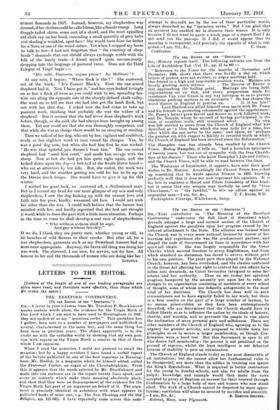[To THE EDITOR OF THE " SPECTATOR."]
Sia,—Your contributor on " The Meaning of the Hereford Controversy " underrates the full blast of discontent which prevails amongst a large and earnest section of the Church of England against the paralysis upon her progress caused by her fettered attachment to the State. The alliance was formed when the Church was in every sense national because by reason of her learning and experience she was the predominant partner, and shaped the ends of Government on lines in accordance with her spiritual ideals. She was largely responsible for the Great Charter which secured freedom to every Englishman, and from which standard no statesman has dared to swerve without peril to his own position. The great part then played by the National Church, however, has been overlooked, and the clauses contained in the Great Act affecting her right to control her own affairs have fallen into desuetude, as Court favourites intrigued to seize her estates and her authority. Thus we see to-day her spiritual progress hampered by the necessity put upon her to refer all changes to an organization consisting of members of every school of thought, some of whom are defiantly antagonistic to the most
vital of her doctrines. The Church has done well in such circumstances not to have signally failed in her work, but there is a firm resolve on the part of a large number of laymen, by no means priest-ridden as they have been contemptuously described, who are determined that the Church should have its fullest liberty so as to influence the nation by its ideals of honour, charity, and worship, and so persuade the people to rise above the inclination of mere personal gain and selfishness. There are other members of the Church of England who, agreeing as to the urgency for greater activity, are prepared to whittle down her principles so as to secure a larger membership, as though Con- firmation were a hard test. But this Sacrament ie open to all who desire full membership : the poorest is not penalized on the ground of expense, whilst the least intelligent is not debarred because of inability to pass an examination.
The Church of England stands to-day as the most democratic of all institutions; but she cannot allow her fundamental rules to be disregarded, any more than the soldier in training can ignore the King's Regulations. What is required is better instruction for the young in Sunday-schools, and also for adults from the pulpit; knowledge and example would then make the vows accepted by proxy at Baptism an earnest for their renewal through Confirmation by a large body of men and women who now stand aloof. The work of a Church' cannot be deepened by mere oppor- tunism; conviction will alone be secured by sacrifice and sincerity. .—I am, Sir, &e., - A. EDMUND SPENDER. Retreat, Hooe, near Plymouth.


























 Previous page
Previous page